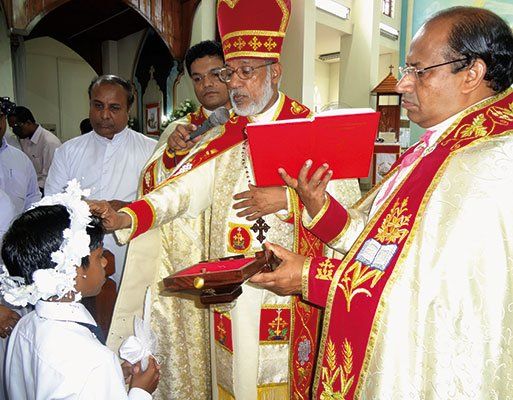Reconciliation
Reconciliation (Sacraments of Initiation)
The Church has the power to forgive all sins. This forgiveness of sins is a true sacrament instituted by Christ, different from baptism, particularly on account of its judicial form. Sins are forgiven only by the sacrament of penance. Sins are forgiven by absolution which can only be given by an authorized priest. It is a real judicial pardon. The Church has the power to reserve certain cases. On the part of the sinner contrition, confession and satisfaction are required. Contrition is aversion to the sins committed. Perfect contrition remits sin even before confession if it is joined with the intention to confess. Imperfect contrition (attrition) is sufficient if there is confession, and is a good and salutary thing. Confession must cover all mortal sins committed since baptism and not previously confessed. Venial sins, and sins already confessed can validly be confessed. And satisfaction. The effect of the sacrament is reconciliation with God, that is, the remission of sins and the eternal punishment but not all the temporal punishment.
Christ’s love is shown in the fact that he seeks the lost and heals the sick. That is why he gave us the SACRAMENTS of healing and restoration, in which we are freed from sin and strengthened in our physical and spiritual weakness.
Jesus himself instituted the sacrament of Penance when he showed himself to his apostles on Easter day and commanded them, “Receive the Holy Spirit. If you forgive the sins of any, they are forgiven; if you retain the sins of any, they are retained” (Jn 20:22a-23). [1439, 1485] Nowhere did Jesus express more beautifully what happens in the sacrament of Penance than in the parable of the Prodigal Son: We go astray, we are lost and can no longer cope. Yet our Father waits for us with great, indeed, infinite longing; he forgives us when we come back; he takes us in again, forgives our sins. Jesus himself forgave the sins of many individuals; it was more important to him than working miracles. He regarded this as the great sign of the dawning of the kingdom of God, in which all wounds are healed and all tears are wiped away. Jesus forgave sins in the power of the Holy Spirit, and he handed that power on to his APOSTLES. We fall into the arms of our heavenly Father when we go to a PRIEST and confess.
God alone can forgive sins. Jesus could say “Your sins are forgiven” (Mk 2:5) only because he is the Son of God. And PRIESTS can forgive sins in Jesus’ place only because Jesus has given them that authority. [1441-1442] Many people say, “I can go directly to God; why do I need a priest?” God, though, wants it otherwise. We rationalize our sins away and like to sweep things under the rug. That is why God wants us to tell our sins and to acknowledge them in a personal encounter. Therefore, the following words from the Gospel are true of priests: “If you forgive the sins of any, they are forgiven; if you retain the sins of any, they are retained” (Jn 20:23).
Penance is often misunderstood. It has nothing to do with low self-esteem or scrupulosity. Penance is not brooding over what a bad person I am. Penance frees and encourages us to make a new start.


